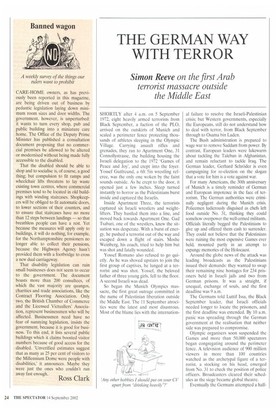Banned wagon
A weekly survey of the things our rulers want to prohibit CARE-HOME owners, as has previously been reported in this magazine, are being driven out of business by pedantic legislation laying down minimum room sizes and door widths. The government, however, is unperturbed: it wants to turn every shop, pub and public building into a miniature care home. The Office of the Deputy Prime Minister has published a consultation document proposing that no commercial premises be allowed to be altered or modernised without being made fully accessible to the disabled.
That the disabled should be able to shop and to socialise is, of course, a good thing; but compulsion to fit ramps and wheelchair lifts threatens to lay waste existing town centres, where commercial premises tend to be located in old buildings with winding staircases. Shopkeepers will be obliged to fit automatic doors, to lower sections of their counters, and to ensure that staircases have no more than 12 steps between landings — so that breathless people can have a rest. Yet because the measures will apply only to buildings, it will do nothing, for example, for the Northamptonshire pensioners no longer able to collect their pensions, because the Highways Agency hasn't provided them with a footbridge to cross a new dual carriageway.
That disability legislation can ruin small businesses does not seem to occur to the government. The document boasts more than 200 consultees, of which the vast majority are quangos, charities and trade associations, like the Contract Flooring Association. Only two, the British Chamber of Commerce and the Licensed Victuallers' Association, represent businessmen who will be affected. Businessmen need have no fear of nannying legislation, insists the government, because it is good for business. To this end, it lists several public buildings which it claims boosted visitor numbers because of good access for the disabled. 'Unverified estimates suggest that as many as 25 per cent of visitors to the Millennium Dome were people with disabilities,' it announces. Maybe they were just the ones who couldn't run
away fast enough. Ross Clark










































































 Previous page
Previous page